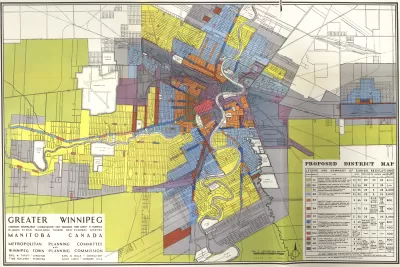Strict separation of uses may be an inefficient way to zone dynamic modern cities.

Scott Beyer argues that current zoning codes impede the adaptive reuse of buildings that used to house offices and large retail, stifling a major potential source of supply that could feed the rising demand for industrial warehousing and residential uses. "Reforming such laws will be crucial for cities that want to stay economically dynamic and avoid the scourge of empty buildings," Beyer writes.
"The Wall Street Journal reports that lending for offices has plummeted to 35 percent of 2019 figures." Meanwhile, "[c]onventional retail faces similar trends. Moody’s predicted that retail vacancy nationwide could be as high as 12 percent in 2021 (it was already 10.6 percent for the first quarter)." But despite the "boom in demand for warehouse space" and rising demand for affordable urban housing, most zoning codes "still require that prime ground-level building space be reserved for increasingly obsolescent office and retail uses."
Communities have pushed back on proposed warehouse facilities. "[E]xamples of hostility to Amazon’s last-mile fulfillment warehouse centers have occurred in Denver, Boston and Seattle, while in central California, opponents of a Walmart distribution center called the project a threat to public health due to truck emissions." Beyer counters that "pushing these warehouses far from population centers will worsen the environment by increasing vehicle miles traveled."
Beyer goes on to discuss "perhaps the biggest zoning-caused distortion in modern real estate: housing. Everything about this sector speaks to scarcity," a problem which he partly attributes to "restrictive zoning laws that stifle new housing projects." Beyer suggests changing zoning codes to "allow empty office and retail spaces to be converted into housing," but also poses a broader question of whether land should be zoned by use at all. While land use zoning can provide an important buffer between residential areas and dangerous industrial uses, for example, strict separation of uses may be an outmoded way of zoning for the "ever-evolving" uses of modern cities.
FULL STORY: Modern Zoning Is Incompatible With Modern Needs

Alabama: Trump Terminates Settlements for Black Communities Harmed By Raw Sewage
Trump deemed the landmark civil rights agreement “illegal DEI and environmental justice policy.”

Planetizen Federal Action Tracker
A weekly monitor of how Trump’s orders and actions are impacting planners and planning in America.

The 120 Year Old Tiny Home Villages That Sheltered San Francisco’s Earthquake Refugees
More than a century ago, San Francisco mobilized to house thousands of residents displaced by the 1906 earthquake. Could their strategy offer a model for the present?

In Both Crashes and Crime, Public Transportation is Far Safer than Driving
Contrary to popular assumptions, public transportation has far lower crash and crime rates than automobile travel. For safer communities, improve and encourage transit travel.

Report: Zoning Reforms Should Complement Nashville’s Ambitious Transit Plan
Without reform, restrictive zoning codes will limit the impact of the city’s planned transit expansion and could exclude some of the residents who depend on transit the most.

Judge Orders Release of Frozen IRA, IIJA Funding
The decision is a victory for environmental groups who charged that freezing funds for critical infrastructure and disaster response programs caused “real and irreparable harm” to communities.
Urban Design for Planners 1: Software Tools
This six-course series explores essential urban design concepts using open source software and equips planners with the tools they need to participate fully in the urban design process.
Planning for Universal Design
Learn the tools for implementing Universal Design in planning regulations.
Clanton & Associates, Inc.
Jessamine County Fiscal Court
Institute for Housing and Urban Development Studies (IHS)
City of Grandview
Harvard GSD Executive Education
Toledo-Lucas County Plan Commissions
Salt Lake City
NYU Wagner Graduate School of Public Service





























